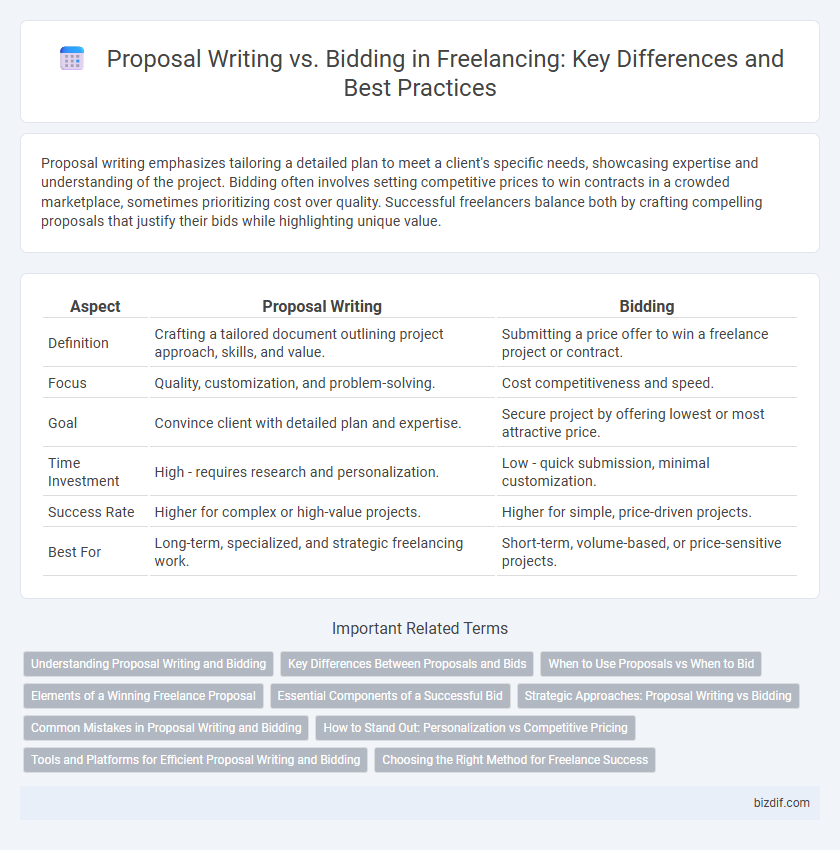Proposal writing emphasizes tailoring a detailed plan to meet a client's specific needs, showcasing expertise and understanding of the project. Bidding often involves setting competitive prices to win contracts in a crowded marketplace, sometimes prioritizing cost over quality. Successful freelancers balance both by crafting compelling proposals that justify their bids while highlighting unique value.
Table of Comparison
| Aspect | Proposal Writing | Bidding |
|---|---|---|
| Definition | Crafting a tailored document outlining project approach, skills, and value. | Submitting a price offer to win a freelance project or contract. |
| Focus | Quality, customization, and problem-solving. | Cost competitiveness and speed. |
| Goal | Convince client with detailed plan and expertise. | Secure project by offering lowest or most attractive price. |
| Time Investment | High - requires research and personalization. | Low - quick submission, minimal customization. |
| Success Rate | Higher for complex or high-value projects. | Higher for simple, price-driven projects. |
| Best For | Long-term, specialized, and strategic freelancing work. | Short-term, volume-based, or price-sensitive projects. |
Understanding Proposal Writing and Bidding
Understanding proposal writing involves crafting a tailored document that clearly outlines your skills, project approach, and value proposition to address a client's specific needs. Bidding focuses on submitting competitive offers, often emphasizing price and deadlines, to win projects posted on freelancing platforms. Mastering both proposal writing and bidding strategies enhances a freelancer's chances of securing contracts by balancing quality communication with strategic pricing.
Key Differences Between Proposals and Bids
Proposals in freelancing emphasize detailed project understanding, showcasing unique approaches and tailored solutions to client needs, while bids primarily focus on pricing and meeting basic project criteria. Proposals often include comprehensive plans, timelines, and value propositions, whereas bids concentrate on cost competitiveness and adherence to requested specifications. Understanding these distinctions helps freelancers strategically craft submissions that align with client expectations and improve win rates.
When to Use Proposals vs When to Bid
Freelancers should use proposals when a project requires a detailed understanding of client needs, showcasing tailored solutions and demonstrating expertise to stand out in competitive markets. Bidding is more effective for straightforward projects with clear parameters and budgets, where price competitiveness is the primary factor for winning contracts. Choosing proposals is ideal for long-term or complex projects demanding personalized approaches, while bidding suits quick-turnaround or commoditized tasks.
Elements of a Winning Freelance Proposal
A winning freelance proposal combines clear project understanding, tailored solutions, and a compelling value proposition that addresses the client's specific needs. Key elements include a concise introduction, detailed scope of work, timeline, budget transparency, and proof of relevant experience or portfolio samples. Including personalized communication and a strong call to action significantly increases the chances of securing freelance projects.
Essential Components of a Successful Bid
A successful bid in freelancing hinges on clear understanding of client requirements, tailored solutions addressing specific project needs, and a competitive yet realistic pricing strategy. Incorporating relevant experience, highlighting unique skills, and presenting a well-structured timeline significantly enhance bid effectiveness. Precise communication, including concise project objectives and deliverables, ensures alignment with client expectations and increases the likelihood of winning the contract.
Strategic Approaches: Proposal Writing vs Bidding
Strategic approaches to freelancing emphasize the difference between proposal writing and bidding, where proposal writing focuses on tailoring personalized solutions to client needs, enhancing chances of project acceptance. Bidding relies on competitive pricing strategies to win contracts, often prioritizing speed and volume over customization. Freelancers who master targeted proposal writing typically secure higher-value projects and foster long-term client relationships.
Common Mistakes in Proposal Writing and Bidding
Common mistakes in proposal writing and bidding include lack of customization to client needs, resulting in generic submissions that fail to address project specifics. Overlooking budget constraints or misrepresenting skills often leads to distrust and bid rejection. Ignoring clear, concise communication diminishes professionalism and reduces the chance of securing freelance projects.
How to Stand Out: Personalization vs Competitive Pricing
Standing out in freelancing requires a strategic balance between personalized proposal writing and competitive bidding. Tailoring each proposal to address the client's specific needs and showcasing unique skills demonstrates professionalism and dedication, while competitive pricing ensures value without undervaluing expertise. Combining customized communication with market-informed rates enhances the likelihood of winning projects and building long-term client relationships.
Tools and Platforms for Efficient Proposal Writing and Bidding
Freelancers leverage specialized tools like Proposify, PandaDoc, and BidSketch to create compelling, professional proposals with customizable templates and tracking features. Platforms such as Upwork, Freelancer, and Fiverr facilitate efficient bidding processes by enabling seamless submission, real-time communication, and bid management. Integrating these tools with project management systems like Trello or Asana enhances workflow, ensuring timely delivery and increased win rates in freelancing projects.
Choosing the Right Method for Freelance Success
Choosing the right method for freelance success depends on understanding the nuances between proposal writing and bidding. Proposal writing allows freelancers to showcase tailored solutions and highlight unique skills, often leading to higher-value projects and long-term client relationships. Bidding focuses on competitive pricing and quick responses, ideal for volume-based work but may compromise earning potential if not approached strategically.
Proposal Writing vs Bidding Infographic

 bizdif.com
bizdif.com